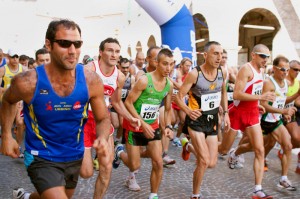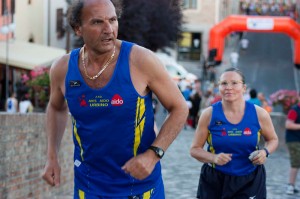Italians love outdoor exercise like competitive running as much as they love their pasta and wine, which may explain why they’re healthier than Americans.
BARCHI, Italy — In this small hilltop village, hundreds of runners and spectators from all over the Marche region flock into the cobblestone streets and gather in anticipation. At nightfall, a booming voice echoes between the tight city walls and calls runners to the starting line. One of the runners, Father Claudio Pantaleo, sporting a blue and yellow jersey, says a silent prayer and awaits the countdown. Tre, due, uno… Via buon divertimento!
The runners surge forward in a current of color and soon fall into pace as they embark on the 11.4 kilometers ahead. While weaving through city streets and following the trail through a neighboring village, time travels quickly for Pantaleo, who spends the race again in prayer. As he approaches the red-carpeted homestretch and crosses the finish, first for his team and thirteenth overall, the bright colors of his jersey are illuminated with the flashes of cameras. These colors and insignia across his chest represent his hometown running club, AVIS/AIDO Urbino Podismo.

At the start of a 10-kilometer road race in Urbania, Father Claudio Pantaleo is one of Urbino Podismo’s fastest runners.
Urbino Podismo is a non-profit organization that works to promote physical activity among young people and adults in the community. The club is open to all people with a desire to pursue running, and also to those with health or weight problems.
“We help them get out of their daily routine and give them the chance as a group to change their lifestyle,” Urbino Podismo president Mauro Bernardini said through a translator.
The club, which gathers regularly at the local athletic stadium, the Campo Sportivo, was founded in 1978 by a small group of men with a passion for fitness, especially running. Today, the team boasts nearly 100 members who take part in a number of fitness activities, like jogging, walking, cycling, and even amateur road races, marathons, and ultra-marathons.
Road races like the one in Barchi are hosted by running clubs almost every weekend across the region and throughout Italy. These unique, high-energy celebrations of fitness have become as much an expression of Italian culture as the overshadowing clichés of pasta, wine and cheese.
In fact, the food stereotypes commonly associated with Italy are a false portrayal of the country’s overall health. Though the nation is widely known for its heaping dishes of pasta, blocks of mozzarella cheese, and endless bottles of wine, it is one of the healthiest in the world because of the combination of its fitness activity and the world-renowned Mediterranean diet, composed of fruits, vegetables and healthful carbohydrates.
[pullquote]I would promote Italy not only for fitness, but for the healthy way we eat.[/pullquote]
“I would promote Italy not only for fitness, but for the healthy way we eat,” Bernardini said.
According to the CIA World Factbook, Italy’s obesity percentage falls far down the list with only 9.8 percent of the population, compared to the United States at 33.9 percent. Although Italy does not rank among the top physically active European nations, the combination of its diet and activity levels helps explain the population’s good overall health.
“They are linked. The physical dimension is made up of care and nutrition, like the oil in a car,” Pantaleo said in Italian. “They are two dimensions very linked to each other.”

Urbino Podismo president Mauro Bernardini warms up with his wife for the 11.4-kilometer road race in Barchi.
Two other organizations that not only contribute to the overall health of Italy, but encourage physical activity through sponsorships are the Associazione Volontari Italiani Sangue (AVIS) and the Associazione Italiana per la Donazione di Organi (AIDO). These two national associations, which oversee blood and organ donations in Italy, sponsor Urbino Podismo and many other running and cycling groups across the country in order to promote the importance of health and physical activity.
“Health and fitness have always been the basic principles of our life,” said Oscar Tempesta, president of AVIS of Urbino.
Another focus of Urbino Podismo, and probably its main point, is a concept called “solidarity.” Solidarity, in Italian culture, means giving back and helping others, especially to those less fortunate. For example, June 1, the day of Urbino’s patron saint, was when the team held its annual hosted race, Notturna dei vicoli e delle mura, “Night of the alleys and the walls.” Participants and spectators were asked to give one to two euro. The proceeds were donated to the victims of recent deadly earthquakes in Emilia-Romagna.
“The aim of our charter is solidarity,” Bernardini said. “All the money we gained was given this year to the people affected by the earthquake. And it is not just runners, but everyone can join the cause. With two euro each, we made a population happy.”
Regular training and exercise are part of everyday life for members of Urbino Podismo and many clubs like it. From shopkeepers to retired professors, from college students to clergymen, the team is made up of dedicated runners from all professions and all walks of life. And like the members’ demographics, their reasons for running and leading an active lifestyle vary widely.
Some members, like 59-year-old Eris Santi, run for health reasons and to surround themselves with young, positive energy.
[pullquote]To me, because I run for pleasure, it is fun, and I do it to be fit and for my health.[/pullquote]
“To me, because I run for pleasure, it is fun, and I do it to be fit and for my health,” he said in Italian over the commotion before his race. “It means keeping fit, feeling younger, because I run with younger people, and feeling a lot of energy.”
For others, like Father Pantaleo, running is an expression of both one’s physical and spiritual life.
“It is like a celebration, a Mass, a spiritual moment,” he said. “The physical expression during a race is a celebration in which I offer my body together with what I have lived during that week.”
But for Bernardini, running is simply a means of escape.
“To me it means a lot,” he said. “It means being free. When you run it is a way of getting rid of everything. When I run, I can even get rid of my glasses. So, really, everything. Running is the best thing in the world because you only need a pair of trousers and a t-shirt – and no glasses.”
Multimedia